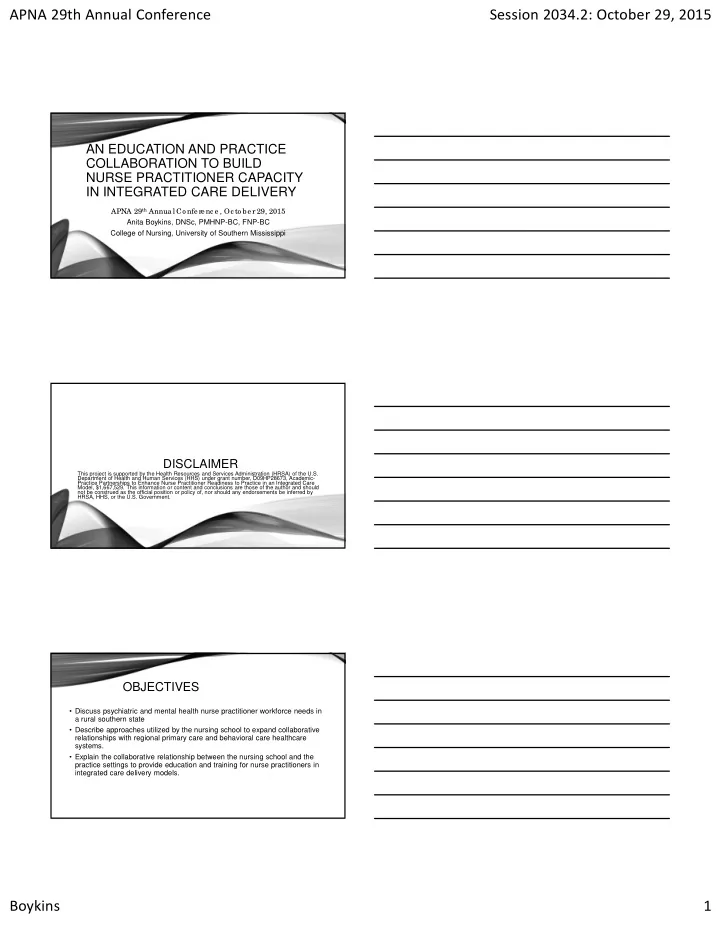

APNA 29th Annual Conference Session 2034.2: October 29, 2015 AN EDUCATION AND PRACTICE COLLABORATION TO BUILD NURSE PRACTITIONER CAPACITY IN INTEGRATED CARE DELIVERY APNA 29 th Annual Co nfe re nc e , Oc to be r 29, 2015 Anita Boykins, DNSc, PMHNP-BC, FNP-BC College of Nursing, University of Southern Mississippi DISCLAIMER This project is supported by the Health Resources and Services Administration (HRSA) of the U.S. Department of Health and Human Services (HHS) under grant number, D09HP28673, Academic- Practice Partnerships to Enhance Nurse Practitioner Readiness to Practice in an Integrated Care Model, $1,667,529. This information or content and conclusions are those of the author and should not be construed as the official position or policy of, nor should any endorsements be inferred by HRSA, HHS, or the U.S. Government. OBJECTIVES • Discuss psychiatric and mental health nurse practitioner workforce needs in a rural southern state • Describe approaches utilized by the nursing school to expand collaborative relationships with regional primary care and behavioral care healthcare systems. • Explain the collaborative relationship between the nursing school and the practice settings to provide education and training for nurse practitioners in integrated care delivery models. Boykins 1
APNA 29th Annual Conference Session 2034.2: October 29, 2015 NATIONAL EDUCATION AND PRACTICE NEEDS T he Institute of Medic ine T he Affor dable Car e Ac t Pr ovisions F utur e of Nur sing r e por t • Nurses should • Train primary care and mental • practice to the full extent of their health providers education and training • Expand advanced practice nurses • achieve higher levels of education and training through in community-based settings improved education systems that • Training programs that focus on promote seamless academic progression primary care models that integrate • be full partners with other physical and mental health care healthcare professionals in redesigning healthcare . STATE LEVEL ASSESSMENT • Rural State • High Poverty Levels • High Minority Population • Poor Health • Health Rankings • Mental Health Outcomes • Complex Practice Settings • Inadequate Mental Health Professional Workforce STATE LEVEL WORKFORCE NEEDS • Workforce Development • Mental Health Professional Workforce Shortage • Prescribing Providers • Physicians • Nurse Practitioners • Build Workforce Capacity • 91 Medically Underserved Areas (MUAs) • 261 Health Professional Shortage Areas (HPSAs) • 42 Mental Health HPSAs • 110 Primary Care HPSAs Boykins 2
APNA 29th Annual Conference Session 2034.2: October 29, 2015 EDUCATION AND PRACTICE SETTINGS Practice Settings Educational Setting • Behavioral Care Settings • Comprehensive doctoral university with high research activity • Regional community mental health centers • Advanced Degree Programs • Acute inpatient behavioral care • Family Nurse Practitioner and facilities Psychiatric Mental Health Nurse Practitioner (PMHNP) MSN • Community Based Primary Care degree and Post-graduate Settings certificate • Rural Health Clinics • Doctor of Nursing Practice • Federally Qualified Health Centers (DNP) and PhD degree REGIONAL EDUCATION AND PRACTICE COLLABORATION • Grant Proposal • Workforce development • Increase number of PMHNPs through a qualified workforce • Build workforce capacity • Rural, underserved primary and behavioral care settings • New models of providing education and training • Increase involvement of practice partners in NP training • New models of health care delivery • Integrated care APPROACHES TO EXPAND EDUCATION AND PRACTICE COLLABORATION • American Association of Colleges of Nursing (AACN) Academic- Practice Partnerships Resources • http://www.aacn.nche.edu/leading-initiatives/academic- practice-partnerships • AACN and AONE Guiding Principles for Academic Practice Partnerships • Academic Practice Partnership Toolkit • Template to Develop Academic-Practice Partnership Boykins 3
APNA 29th Annual Conference Session 2034.2: October 29, 2015 TEMPLATE ACADEMIC-PRACTICE PARTNERSHIP • Players • Selecting Partners • Preparing for the First Meeting • Partnerships • Initial Meeting • Subsequent Meetings • Environment • Time • Space • Regulation • Context AACN Template to Develop Academic-Practice Partnership- http://www.aacn.nche.edu/leading-initiatives/academic-practice- partnerships/Template.pdf EDUCATION AND PRACTICE COLLABORATION • Identified health care organizations • Interested in establishing integrated models of healthcare delivery • Collaboration with current practice sites • Community based primary care clinics • Regional mental service areas • Community mental health centers • Acute inpatient behavioral care facilities EDUCATION AND PRACTICE COLLABORATIVE RELATIONSHIP • Grant proposal funded • Develop new models of providing education and training • Student and Preceptor Training • Curriculum Improvements • Develop new models of health care delivery • Behavioral health and primary care integration • Integrating primary care in behavioral care settings • Integrating behavioral care in primary care settings Boykins 4
APNA 29th Annual Conference Session 2034.2: October 29, 2015 DOCTORAL PREPARED NURSE PRACTITIONER EDUCATION • Post-graduate Nurse Practitioner Certificate and Doctor of Nursing Practice Degree option • Curriculum Mapping of Course Content • AACN Essentials of Doctoral Education for Advanced Nursing Practice Competencies • National Organization of Nurse Practitioner Faculties (NONPF) • Quality and Safety Education for Nursing (QSEN) Graduate Level Competencies • Evidence-based Educational Improvements • New and Existing Courses • Develop Integrative Health Care Delivery Model • DNP Scholarly Project Practice Partner Mentor • Behavioral and Primary Care Integration Standards Boykins 5
Recommend
More recommend